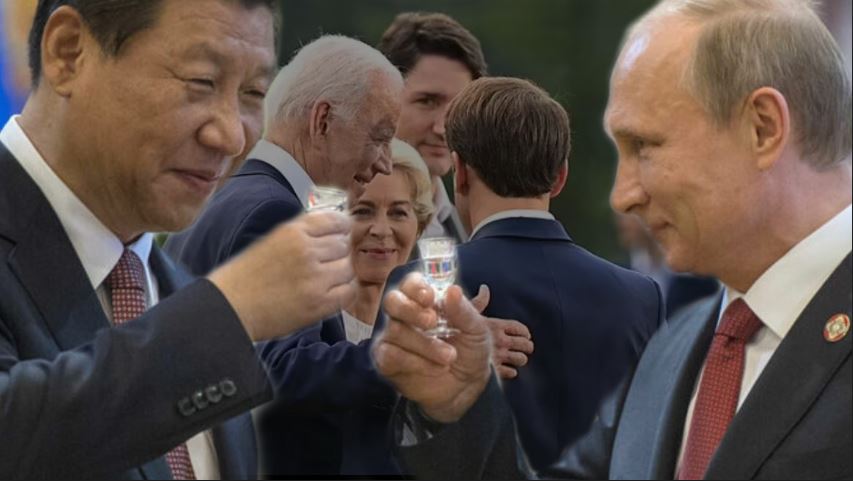When Europe was separated by an Iron Curtain, it was difficult for anyone to travel across the continent. The phrase was coined by former British Prime Minister Winston Churchill in reference to the Soviet Union’s attempts to build a physical and ideological barrier with the west. The latter, on the other hand, aimed to control the expansion and impact of communism via a strategy of containment.
A “Tin Curtain” has been constructed by the West, through G7 and NATO, in order to keep the Global South from integrating with the rest of the world: this time, to prevent it from becoming more integrated.
As recently as last week, Beijing convened an online meeting where BRICS+ was announced as a new organization. A ‘new G8’ or even an alternative to the G7 was now established in this process.
The five BRICS countries (Brazil, Russia, India, China, and South Africa) are a microcosm of the Global South, embracing Southeast Asia, Central Asia, West Asia, Africa, and South America – thus putting the “Global” in the Global South.
As it turns out, Russian President Vladimir Putin’s unambiguous statements during the Beijing conference were clearly intended for the whole Global South, in stark contrast to G7 propaganda:
- Russian energy and fertilizer supplies will be delivered on time.
- Up to 50 million metric tons of Russian grain may be sent worldwide if the harvest is as strong as expected.
- In spite of Kiev’s efforts to blockade the Ukrainian ports, Russia will guarantee that grain tankers may enter the international seas.
- Ukrainian grain’s bad reputation has been exaggerated.
- – G7 nations are to blame for the rapid rise in global inflation, not Ukraine’s Operation Z.
- International law has been eroding for some time, and the resulting imbalance in global relations has been unavoidable.
At the same time, Putin brought up an issue that the BRICS nations have been debating since the 2000s: the creation and use of a global reserve currency.
Banks in the BRICS nations may link to the Russian Financial Messaging System.
There is a growing presence of the Russian MIR payment system outside the United States. We are considering the creation of a worldwide reserve currency based on a BRICS currency basket,” Russian President Vladimir Putin stated in an interview with the BBC.
Western sanctions after Operation Z, Moscow’s entire de-dollarization, and an increase in commerce between BRICS states have all contributed to this outcome. For example, by 2030, China and India will account for a quarter of the world’s oil consumption, with Russia as the primary source.
The “RIC” in BRICS simply can’t afford to be shut out of a financial system controlled by the G7 in any way. Even India, a nation known for its tightrope walking, is beginning to catch on.
BRICS countries now account for 40% of the global population, 25% of the global economy, 18% of global commerce, and 50% of global economic growth. All the signs point to positive development.
If developing economies’ views are not heard in the future years, we need to seriously consider putting up an alternative regional system, or maybe even a worldwide one,” Russian bank VEG CEO Sergey Storchak said.
Sergey Glazyev, Russia’s Minister of Integration and Macroeconomics, has lately produced a startling manifesto expressing his views on the sovereignty of the global economy, which is being debated between the EAEU and China.
There will be a parallel expansion in trans-Eurasian financial markets to President Xi Jinping’s Global Development Initiative (GDI), which was unveiled at UNGA last year.
The Belt and Road Initiative (BRI), which consists of economic corridors from Eurasia to Europe’s western peninsula, may be considered a support mechanism for GDI.
The GDI, an organization founded in 2015, was discussed during the BRICS summit’s High-Level Dialogue on Global Development.
This initiative’s goal is to boost funding for several organizations, including the South-South Cooperation Fund, International Development Association (IDA), Asian Development Fund (ADF), and Global Environmental Facility (GEF) (GEF).
Poverty reduction and food security, as well as the COVID-19 response and vaccinations, are all high on the list, as are industrialization and digital infrastructure, among other things. In early 2022, a Friends of the GDI organization was formed and has already attracted more than 50 countries.
As Xi said at the BRICS conference, “some nations are politicizing and marginalizing the developmental objective by throwing up barriers and laying punishing penalties on others.”
However, the G7 and NATO aren’t exactly fans of sustainable development.
There’s a stated goal for the G7 meeting to “project togetherness” in the sense that the West’s stalwarts (Japan included) would unite in a long-term “support” for Ukraine’s indefensible state.
Aside from it, as German chancellor Scholz said in a speech to the Bundestag, there is a “battle against hunger and poverty, health problems and climate change.”
Scholz advocated for a Marshall Plan for Ukraine in Bavaria, a ridiculous idea given that Kyiv and its surroundings might be reduced to a small rump state by the end of the decade. Scholz said the idea that the G7 might collaborate to “avoid a terrible catastrophe” is absurd, given that the impending famine is a direct result of the sanctions hysteria enforced by the G7.
The inclusion of India, Indonesia, South Africa, and Senegal in the G7 was a further amusing touch.
It would be foolish to expect any serious study of the collapse of global supply networks and the causes that pushed Moscow to cut gas deliveries to Europe from the remarkable collection of mediocrities “unified” in Bavaria under de facto European Commission (EC) chief Fuehrer Ursula von der Leyen. It was instead Putin and Xi who were accused.
“The Russian danger” will be kept at bay by the “Tin Curtain” — a 21st-century reimagining of the Intermarium from Baltic to the Black Sea, which includes Poland, and the Three Baltic Midgets (Bulgarian Romanian Slovenian Czechia), as well as NATO-aspiring Sweden and Finland. As Britain returns to the position of an island-state, the EU’s participation in the G7 is particularly illuminating, given the EU’s dominance over Germany, France, and Italy.
Every year, the European Union issues up to 60 “directives.” They must be enacted into EU member-state legislation as a matter of urgency. In most circumstances, there is no room for argument.
It’s also worth noting that the European Commission (EC) in Brussels issues more than 10,000 “rulings” to every European nation, which are essentially neoliberal “recommendations” on everything from health care to education to pension changes that must be implemented.
Elections in any EU member state are thus pointless. Presidents like Macron, Scholz, and Draghi are little more than ordinary administrators. Only smokescreens, like “EU ideals,” are allowed: “democracy” and “EU values.”
Appointed via an agreement between executive branches, the true government is run by an elite group of apparatchiks who use their authority in an exceedingly opaque way.
The EC is completely unaccountable. Ursula von der Leyen, the worst German Minister of Defense of modern times, rose to become the current EC Fuhrer, dictating the EU’s foreign, energy, and even economic policies.
With all of its chilling Cold War 2.0 echoes, the “Tin Curtain” is really only a prelude to the main event: a bloodbath throughout the Asia-Pacific rebranded the “Indo-Pacific,” which is a carbon duplicate of the Ukraine scam aimed at containing China’s BRI and GDI.
To fight the imperial AUKUS/Quad/IPEF alliance, it’s instructive to see how the Chinese foreign ministry is currently emphasizing in great detail the distinction between BRICS and BRICS+.
Global development is at the heart of the BRICS, as is economic recovery via collaboration and better global governance.
Cold War mindset; exploiting developing nations; banding together to restrain China, and an America-first strategy in which the “rules-based international order” is enshrined are all hallmarks of the US-concocted racket.
G7 leaders assembled in Bavaria should not be expected to appreciate the ridiculousness of limiting Russian oil and gas exports, for example. If that were the case, Moscow would have no issue shutting off all of the G7’s energy supplies. Oil and gas import costs would skyrocket if other countries were excluded.
So it’s no surprise that the future is gloomy. As Russian Foreign Minister Sergei Lavrov put it in an interview with Belarusian state television, “the west hates honest competition.”
Because of this “suppression of anything that violates in some manner the neoliberal vision and order of the world” has reached its pinnacle.
Get more stories like this here:
-
Replacing the NWO and the Weaponized Petrodollar with BRICS+ Multipolarity
-
Eurozone Debt Crisis 2.0 Could Result In A Regional Bail-In
-
Food Shortages In Six Months – The Globalists Are Telling Us What Happens Next










0 Comments